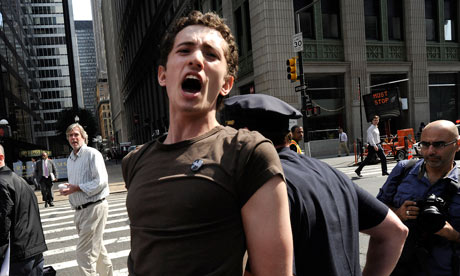Occupy Wall Street plans return to spotlight – but in what form?
Demonstrators torn over whether to concentrate on economic inequality or to move towards protesting police brutality

An Occupy demonstrator being arrested. The protesters say the NYPD has been using heavy-handed tactics. Photograph: TIMOTHY A. CLARY/AFP/Getty Images
Occupy Wall Street returned to the public spotlight this week following the largest mass arrest of its supporters since the movement was evicted from its home base in November.
Last weekend's events, including a female protester apparently having a seizure while handcuffed – combined with numerous accounts of excessive police force – have been described by many protesters as some of the most violent in Occupy history. A New York Daily News reporter on the scene said the New York City police was "out of control".
This weekend, occupiers plan to push back.
In a press conference earlier this week, Occupy participants and community groups that have long criticised the NYPD demanded the resignation of the commissioner, Ray Kelly. On Saturday, Occupy organisers will call on victims of police abuse to join them in a mass demonstration aimed at denouncing a wide range of NYPD policies and practices.
The action will be held in combination with the United Nations' international day for the right to the truth concerning gross human rights violations and for the dignity of victims.
The activists argue that the event is not about Occupy Wall Street, but is a wider critique of NYPD tactics city-wide, particularly in low-income and black communities.
According to Occupy organiser, Gary Roland, the demonstration is intended to "tell the truth about the victims of human rights violations by the NYPD."
Roland said the department's controversial surveillance of the Muslim community and its widespread use of stop and frisk tactics on the city's streets were two examples of systemic police abuses.
"This is not about OWS," he added. "This is really about justice for the victims."
Throughout the week the demonstrators and police have engaged in a public tug of war over Union Square, one of New York City's most widely-recognised and heavily-trafficked public parks. Many have come to view the square as the next potential base of operations for the movement.
The NYPD appears determined to prevent that from happening and – in a rare move – has shut down the park on multiple evenings with barricades and police officers in an attempt to keep demonstrators out.
On Tuesday night, protesters accused police of using excessive force in clearing them from the area. The next night, following a massive demonstration for the shot Florida teenager Trayvon Martin, two bottles were hurled at the police as they moved demonstrators onto the sidewalk.
A number of demonstrators view the department's efforts at Union Square as an act of political suppression that is at least tacitly condoned by the city's mayor, Michael Bloomberg.
"You want to get arrested? We'll accommodate you," Bloomberg said at a press conference on Monday.
"If you have something, really, to say, that would be a great contribution, nobody can hear you when everybody's yelling and screaming and pushing and shoving.".
Protesters have interpreted the mayor's dismissive attitude as a green light for police to embrace heavy-handed tactics. "What we are facing is a police riot breaking loose," said Alexandre Carvalho.
"Union Square, now, will be the new battleground of Occupy because it's public," Carvalho added. "If the police are barricading a public space, it's a declaration of war."
While many in the movement welcome the revived public attention, questions have been raised over whether the issue of police violence has replaced Occupy's original aim of highlighting economic inequality.
Cecily McMillan, a protester, said she believes there is room for Occupy to criticise both police violence and disparities in wealth. Last weekend videos emerged showing her having an apparent seizure while handcuffed on the sidewalk. McMillan has been charged with assaulting a police officer, an allegation that she denies.
"Police brutality is something that we share right now between Occupy and other community groups," McMillan told the Guardian. "It's something that needs to be addressed immediately. But I do think it is important to move forward and continue to talk about police brutality alongside economic brutality."
McMillan said she believes Occupy should continue to reach out to communities impacted by police violence, and points to the involvement of protesters at Wednesday's march for Trayvon Martin as a step in the right direction. She described the Occupy presence in the march as "a true step towards actually having a movement of the 99%."
"I've been working with Occupy Wall Street since August, particularly with outreach, and that was the first time that I saw a really strong bridge between Occupy and the general public at large," she said.
McMillan said the resignation of Kelly would not be enough to stem the tide of police violence in New York City. "We need to talk about the systematic problems that lead to police violence. The ridiculous assumptions concerning low-income groups and people of colour that lead police to feel justified in performing police brutality."
No comments:
Post a Comment